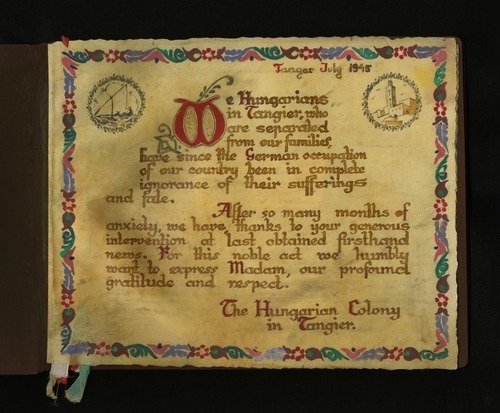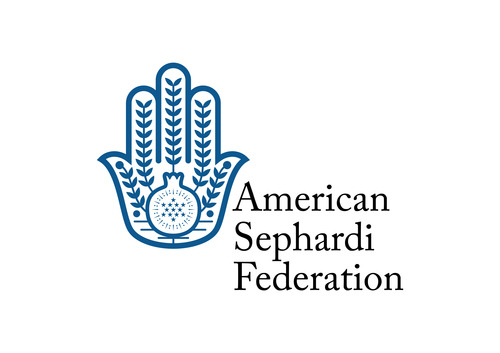By Nicole Greenhouse, Archivist
The
American Jewish Historical Society and the Center for Jewish History are proud
to highlight the AJHS Counter Culture Collections, a set
of over 170 linear feet of 25 smaller collections documenting Jewish involvement
in left politics, the Jewish Renewal movement, the Peace movement, and Jewish
student activism in the 20th century. Materials in the Counter Culture Collection
date as early as anti-war activism in the 1940s to the explosion of
counter-cultural output during the 1960s and 1970s to the contemporary
successor organizations of the counter cultural movement.
The
earliest materials in Counter Culture Collection focus on Jewish activism
combating war. In 1941, the Jewish Peace Fellowship
was founded to support Jewish conscientious objectors in World War II. Over
time, the Jewish Peace Fellowship also supported objectors during Vietnam War and wars in the Middle East up
until the present day.
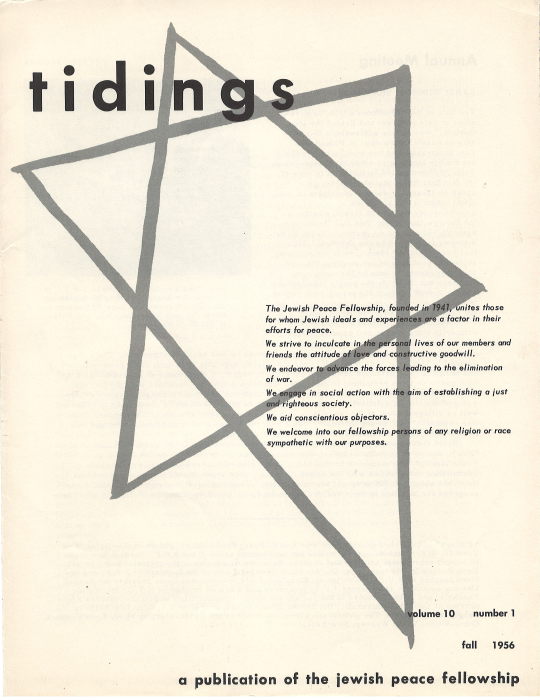
Cover
of of “JPF Tidings”, Fall 1956; Jewish Peace Fellowship Records; I-189; Box 25,
Folder 9; American Jewish Historical Society.
AJHS also holds the records of an early founder
of the Jewish Peace Fellowship, Arthur
Lelyveld, who was an activist
rabbi in Omaha and Ohio. He was most known for his civil rights activities, as
well as his work for the American Jewish Congress (AJC). AJC also had other
activist members, including Virginia
Snitow, who fought for equal
rights for women and was an outspoken opponent on issues of racial inequality, the
Vietnam War, and nuclear power.
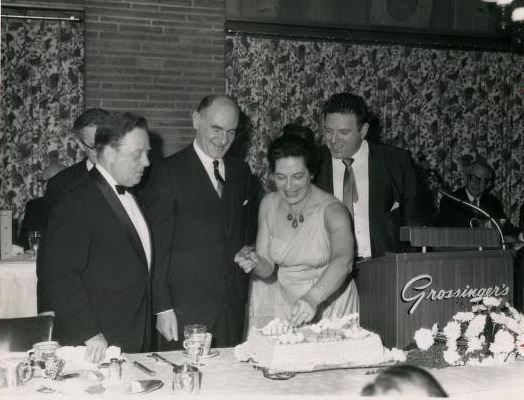
Virginia Snitow lights candles on Israel
Birthday cake at Convention Banquet, with Rabbi Arthur Lelyveld, Shad Polier,
Michael S. Comay, and Theodore Bikel; American Jewish Congress Records; I-77;
Box 745; Folder 31; American Jewish Historical Society.
Jewish
solidarity with people of color during the Civil Rights movement also appears
throughout the collections, especially in Jews for Urban Justice
Records, an organization formed in 1966 in Washington DC,
to end discriminatory practices within the Jewish community. Jews for Urban Justice was also a sponsor of
the first Freedom Seder in 1969, written by Arthur Waskow,
an interfaith event held on the
first anniversary of Martin Luther King Jr.’s death.
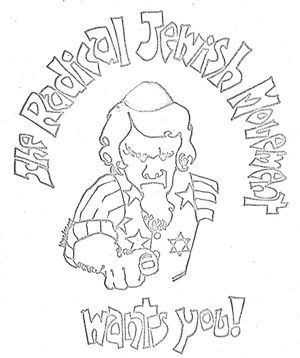
Cover of “An Abbreviated History of Jews
for Urban Justice”; Jews for Urban Justice (Washington, D.C.) Records; I-159;
Box 1; Folder 7; American Jewish Historical Society.
In addition to being
involved in the political aspects of the Counter Culture movement, Jews also began to focus on anti-establishment
and alternative practices in Judaism. Waskow
and other rabbis, like Goldie
Milgram, were leaders in the
Jewish Renewal movement, which featured nontraditional aspects of
Judaism—mysticism and egalitarianism. Havurah were also a significant aspect of
the Jewish Renewal movement; both Shira
Eve Epstein and Riv-Ellen
Prell studied Jewish
communes and prayer groups that identified as havurot.
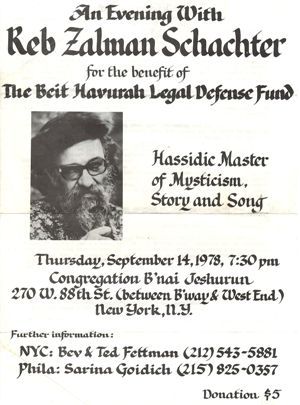
Flier
for Beit Havurah Legal Defense Fund Benefit; Riv-Ellen Prell Papers;
P-795; Box 1; Folder 6; American Jewish
Historical Society.
Waskow was also a member of Breira, founded in 1973 and one of the first Jewish
organizations to advocate for a two-state solution for Israel and Palestine.
Although Breira was short lived, it led to the establishment of other Jewish
organizations that worked toward a two-state solution, including both the New
Jewish Agenda and Brit
Tzedek v’Shalom. Both
Breira and the New Jewish Agenda were co-founded by Gerald
Serotta.
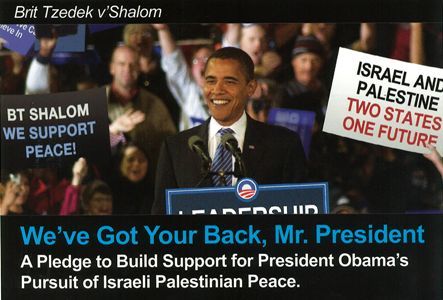
“We’ve
Got Your Back, Mr. President: A Pledge to Support for President Obama’s Pursuit
of Israeli Palestinian Peace” Postcard, 2008; Brit Tzedek
v’Shalom/Jewish Alliance for Justice and Peace Records; I-587; Box
10; Folder 13; American Jewish
Historical Society.
Students and other young people were influential
in pushing for progressive change in the Jewish establishment. In 1969, a group
of students organized a series of disruptions at the Council of Jewish
Federations and Welfare Fund’s General Assembly. Out of these demonstrations
grew the North American Jewish Students Appeal, an umbrella organization made up of student
organizations on college campuses. Member groups like the
North American Jewish Students Network, Progressive Zionist Caucus, Student Struggle for Soviet Jewry, and Lights
in Action aimed to promote Jewish life on college
campuses, often through activism. Student organizations were also prolific
publishers, in addition to NAJSA’s Jewish
Student Press Service’s publishing
efforts, AJHS also holds hundreds of other student publications in their Jewish
Student Organizations Collection.
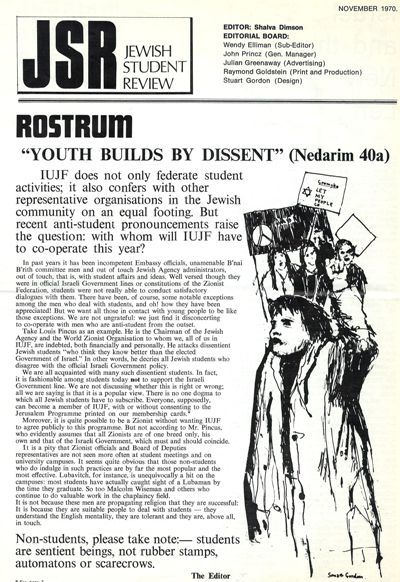
Cover of “Jewish Student Review,” November
1970; Jewish Student Organizations Collection; I-61; Box 27; Folder 1; American
Jewish Historical Society.
Other collections at AJHS focused on Counter Culture include the Jewish
Labor Committee Records, Vermont
Chapter of the New Jewish Agenda Records, Trees and Life for Vietnam Records, Leonard
Fein Papers, Ruth
Abusch-Magder Papers, Jack
Jacobs Papers, Jack
Nusan Porter Papers, and the
general Jewish Counter Culture Collection.
Also materials in these collections focus on a number of issues often
associated with the Left, such as feminism, nuclear disarmament,
environmentalism, LGBT rights, global peace, workers rights, racial inequality,
and criticism of Israeli policy.
All these collections are open for public use in the Lillian Goldman Reading
Room, come visit the Center for Jewish History to study these records from our partner the American Jewish Historical Society.


